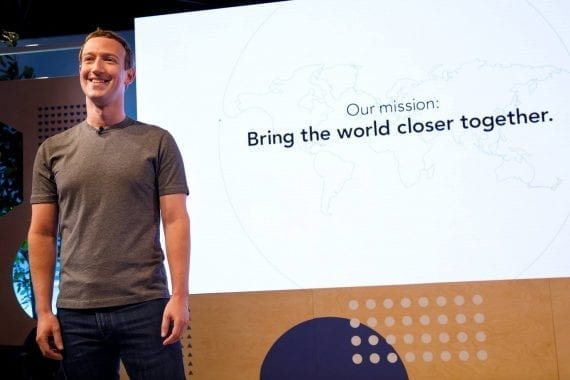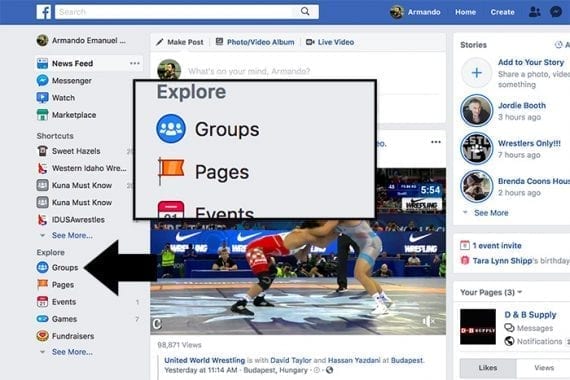Ecommerce businesses can use Facebook groups to help potential customers, build strong reciprocal relationships, and encourage sales.
Maintaining or contributing to a Facebook group is a form of both social media marketing and content marketing (distribution and publication). As with social media and content, the goal is to listen to the conversations that take place in the group and contribute in a positive way, answering questions or providing helpful information with posts, links to articles, or similar.
Marketing expert Neil Patel, the founder of Kissmetrics and Crazy Egg, described marketing with Facebook groups in a 2017 YouTube video.
“With your Facebook group you are building connections with people,” Patel said. “As you help other people out and create more engagement, what you’ll notice is the community is there; they’re going to support you, and they’re much more likely to go to your website, visit your article, share it, promote it, and even buy your products or services.”
Potential customers who engage with your business in a community can develop an affinity for your company and products. They may feel a sense of reciprocity because of all of the help you provide. Or they may have a sense of familiarity because they are already accustomed with seeing your brand as you post and contribute. In either case, the relationship you build with potential customers in a Facebook group can impact your ecommerce sales.
What Are Facebook Groups?
A Facebook group is a page built around a topic, product, relationship, or event. It is a place where individuals can come together to share information, relay experiences, ask questions, and generally connect with folks who have similar interests.
A group differs from Facebook profile pages, which are typically a business’s or organization’s official presence on Facebook. A group is a community.
Groups are also fundamental to Facebook’s mission. In June 2017, Facebook’s Mark Zuckerberg wrote a post about how Facebook was redefining itself as a company.
“I believe the most important thing we can do is work to bring people closer together. It’s so important that we’re changing Facebook’s whole mission to take this on.”
“We need to give people a voice to get a diversity of opinions out there, but we also need to build enough common ground so we can all make progress together. We need to stay connected with people we already know and care about, but we also need to meet new people with new perspectives. We need support from family and friends, but we also need to build communities to support us as well.”

Facebook founder, chairman, and CEO Mark Zuckerberg believes community is important.
For a pragmatic ecommerce marketer, Facebook’s emphasis on communities could be a strong indication that groups and group posts may receive preferential treatment in feeds. Thus, your posts in a group could have good reach.
Find a Group
There are a few ways to find an existing Facebook group. You can click the “Group” link under the word “Explore” on the left side of the desktop version your Facebook profile page. You can simply navigate to facebook.com/groups. Or you can just search and then filter the results to only show groups.

There are several ways to find Facebook groups. For example, if you are using the desktop version of Facebook, there is a link to groups on the left side of the page.
Facebook also has a section devoted to discovering groups. It’s under the “Discover” tab on the group page.
There are likely plenty of groups of folks interested in the industry segment you serve. For example, imagine your online store sells vegan-friendly men’s shoes — no leather. This is a relatively small niche market, but there are dozens if not hundreds of vegan groups on Facebook.
You could join a group, share recipes, warn folks about, say, the Chinese bistro that fries its tofu in beef fat, and when someone asks about vegan-friendly men’s shoes, you can answer, “I actually sell vegan-friendly men’s shoes online. Message me and I will get you the details.”
You do need to know that many groups don’t allow specific product promotion. So be certain to follow the community rules.
Create a Group
From the groups’ page on Facebook, you can also create your business’s own group.
One of the most often cited examples of a successful product-focused group is the Instant Pot Community. The group has a following of about 1.5 million folks, all interested in the company’s products.
For ecommerce marketers, there may be a real opportunity to both create a group around your store or industry and participate in several existing Facebook groups.
Contributing to a Group
As is generally true of social media marketing and content marketing, your Facebook group campaigns will require you to do some reading and sharing.
“I am actually a pretty big fan of [Facebook groups],” said entrepreneur and speaker Gary Vaynerchuk. “I think building community on Facebook is very smart…. If you’re going to build a group…you’ve just got to make a commitment to be in the group.”
“It’s like 2003 forums. Building a forum on the internet in 2002 was a good idea. It was a good idea in 2006. The problem is, you’ve got to be in it. You’ve got to be in there…. If you’re going to build a community, don’t think someone else is going to run it for you or it’s going to take care of itself. You’ve got to manage it, and you’ve got to live in it and provide value.”
The specific actions of “being in the group” will differ whether you are participating in an existing community or establishing a new Facebook group you administer. But there are a few common principles.
For example, you will need content. This should probably be in the form of articles or videos from your website. But it may also be helpful curated content too.
You’re going to need to ask and answer questions. Not stock made-up questions, but questions that make sense in the context of the group.
For more, check out the list of 27 tips and hacks for your Facebook group from Pat Flynn, an entrepreneur and business speaker with a large and successful Facebook community.



